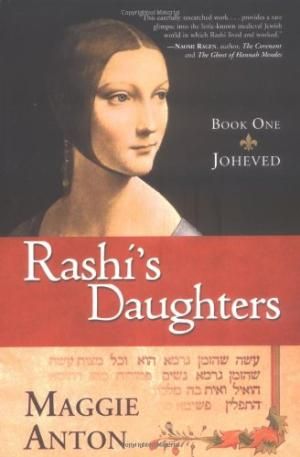Notes
Review
“A forceful novel of the power of learning, faith, and the two sides of love.”
Midwest Book Review
“Anton has reimagined the life and world of the famed eleven-century biblical teacher Rashi through the lives of his three daughters.…Readers will definitely be hooked on this series.”
—Romantic Times
“Impressive work…a fine storyteller…an absorbing, detailed account.”
—Jewish Journal
“The writing successfully captures the pace of medieval life and pulls the reader into the details of the characters’ lives.”
—Jewish Times News
One of the most brilliant biblical commentators that ever lived was Salomon Ben Isaac, better known as RASHI (RAbii SHlomo Itzchaki).
Rashi was born in 1040 and died in 1105, living for the most part of his life in Troyes, France. He was widely renowned for his succinct explanations and elaborations of Biblical text that were quite innovative, as they were written down, shifting from an oral to a written tradition.
In addition to running his own Yeshiva (Talmud academy), Rashi operated a wine making establishment, in order to support his wife and three daughters.
Author Margaret Anton's, Rashi Daughters, is the first in a series of a three-volume family saga of the fascinating lives of Rashi's three daughters, Joheved, Miriam and Rachel. The initial novel focuses on his eldest daughter, Joheved.
What makes this historical fiction particularly absorbing is Anton's ability to seamlessly infuse her own historical and biblical knowledge into the lives of her characters with rich detail of an era unfamiliar to many of us.
Apparently, the author devoted five years of historical research and ten years of Talmud study prior to her writing the series.
Most significant is the author's meticulous research enlightening us of every thing from backward superstitions, sexual rituals and marital relations, Jewish holidays, childbirth, life-cycle events, to the daily lives of Jews living in eleventh century France.
Particularly compelling, however, is the way Rashi himself is depicted. Anton does not loose sight of his fundamental humanity. He is portrayed as not someone who is haughty, narrow minded and stubborn, but rather a sensible man who sought middle ground solutions to some of the difficult challenges he had to face.
Examples of his sharp mind can be seen in the manner he skillfully handles the request made to him by his daughter Joheved to put on tefillin (phylacteries, small leather cases containing passages from scripture worn by Jewish men while reciting the morning prayers).
Another is how he dealt with the insistence by his daughters that they be permitted to learn the Talmud. In fact, some rabbis felt that if you teach women the Talmud you teach them lechery.
Rashi's Daughters is a wonderful, richly textured yarn incorporating all the sights, sounds and impressions of an eleventh century Jewish community, where Jews did not experience the anti-Semitism prevalent in later centuries, and where the Church tolerated Jews, rarely interfering with how they practiced their religion.
Anton's sentimental portrait of Joheved and some of her rebellious adolescence reactions is admirable and even at time surprising when you consider that this was an era where men were not too eager to have women in a position of knowledge.
Readers will find Anton's first book in the series a pleasant read with well-defined principal and ancillary characters and some engaging tales, and I am looking forward to reading the second pertaining to Miriam.



 English
English  Nederlands
Nederlands  Deutsch
Deutsch  Français
Français  Español
Español  Magyar
Magyar  српски
српски  Dansk
Dansk  Italiano
Italiano  Svenska
Svenska  Slovenčina
Slovenčina  Português
Português 

